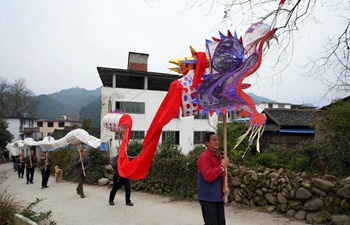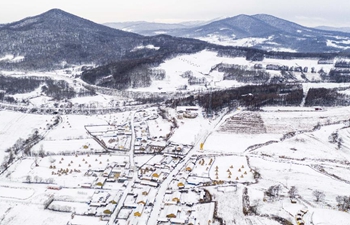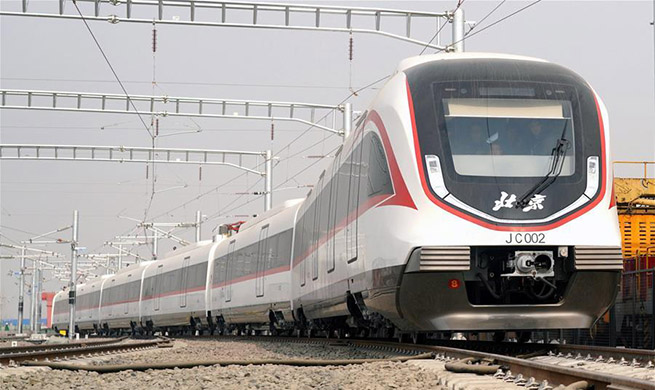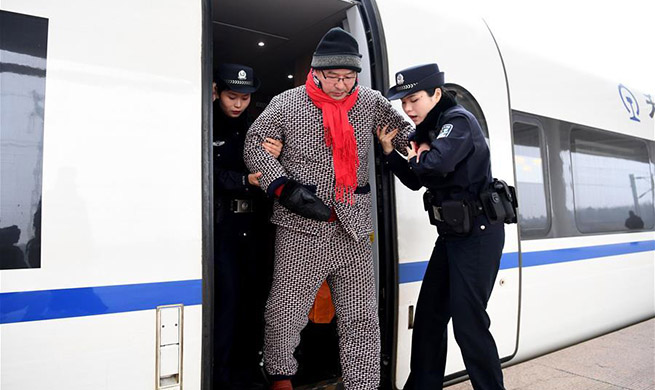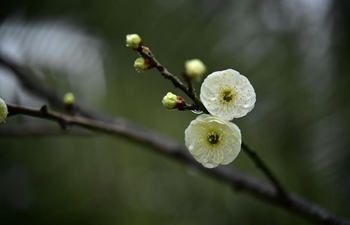GUANGZHOU, Jan. 30 (Xinhua) -- Migrant worker Wu Shuijin feels a little lonely during his Spring Festival homecoming journey this year, because he failed to persuade his co-workers to join his motorcycle trip.
At a rest stop of the No. 321 highway of Zhaoqing City in China's southern Guangdong Province, Wu and his wife got off their motorcycle to stretch their legs and drink some water.
"This place used to be filled with motorcyclists at this time of year, but now it's really quiet here," he said looking around the stop where only a dozen motorcycles are parked.
During the past six years, Wu, who works in Guangdong's Foshan, has rode a motorcycle back to his home in Wuzhou city of neighboring Guangxi Zhuang Autonomous Region for Spring Festival.
The co-workers who rode back with him in the previous years have chosen high speed trains or private cars instead this year.
Wu has been a witness to shrinking motorcycle fleets, typical in southern China, which has a large migrant worker population and warm weather. The Pearl River Delta has seen fleets of homebound motorcyclists amid the Spring Festival travel rush over the past decade.
Wearing waterproof coats and leather knee pads and carrying bulging bags, the motorcycle fleets once made headlines in Chinese media, but such heroic trips are fading into memory due to sprawling railway networks and increasing car ownership.
Wu's hometown Wuzhou is a city on the border between Guangdong and Guangxi. The number of motorcycles flowing into the city from Guangdong during Spring Festival travel rush was reduced from 250,000 in 2013 to 55,000 in 2018. It is estimated that the number will drop by 5,000 MORE this year.
The No. 321 and No. 324 highways are major paths for motorcycles to leave the Pearl River Delta.
"In the past, we would use up several boxes of water in one day, but now there is still much left in this box after half a day," said volunteer Zhang Min who has been working at a rest stop of the No. 321 highway for the past three years. "I can see an obvious drop in the number of motorbikes both this year and last year," she said.
Some reporters, who waited at the roadside expecting to capture magnificent pictures of motorbikes, were also disappointed to see the declining number of motorcyclists.
Apart from the expanding railway networks, better countryside roads are also enabling migrant workers to abandon motorbikes. During the past several years, China has been upgrading countryside roads as part of efforts to revitalize the countryside and reduce poverty.
"In the past, I had to ride a motorbike as it would be hard for me to carry the luggage back after getting off the bus. But now the bus can reach my doors thanks to the new roads," said Su Wenxun, a migrant worker from Guangxi who works in Foshan.
Better infrastructure and more private cars are changing the way people observe Spring Festival in the countryside. In the past, many villagers would visit family and friends by bike, motorcycle or on foot. Now it's more common for them to drive.
"It's normal to see traffic jams in our village at new year time," said Wu Shuijin. The couple and their son work in a paper box factory. They bought a car last year. The son who finished working earlier drove back home with some friends.
"The income of migrant workers are rising. It's no big deal for us to buy a car now," Wu said.
He believes that there will still be motorcyclists joining the Spring Festival travel rush in the future. "But it will be individual phenomenon instead of a dramatic spectacle."




